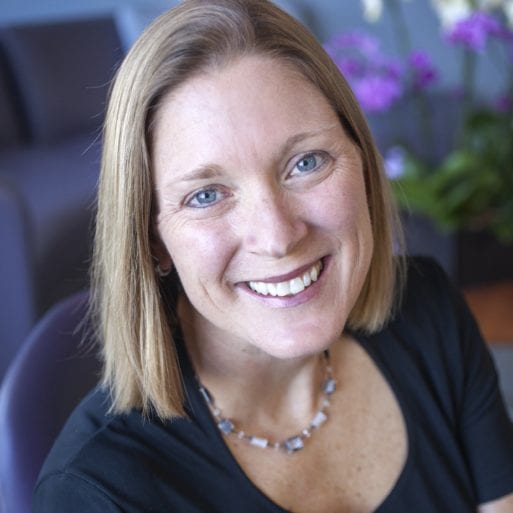Today SevenPonds speaks with Natalie Lagomarcino Ledesma, a cancer nutrition specialist who works primarily with adult cancer patients at the UCSF Helen Diller Cancer Center in San Francisco. She also works at Smith Integrative Oncology in San Francisco, where her nutrition expertise is part of a cancer treatment program that combines traditional medical practices with advanced support in Chinese medicine, integrative psychotherapy, oncology massage and body conditioning and fitness. Natalie has traveled nationwide as a consultant for the Eli Lily pharmaceutical company. A devoted mother, Natalie enjoys swimming, yoga, running and playtime with her family — and prefers to be thought of as bringing home the kale (in lieu of the bacon) from her day job.
Editor’s note: This interview has been edited for length and clarity.
Laura B. Hayden: Hello Natalie and welcome to SevenPonds. I’d like to start off our conversation by asking you about your clientele. Your position as a cancer nutrition specialist pairs you with patients at a very stressful time in their lives. How difficult is working with people who have been diagnosed with cancer?
Natalie Lagomarcino Ledesman: It’s true that 90 percent of the people I work with are just beginning their cancer treatment. They don’t have any control over a variety of different factors of cancer. But, as they learn how to provide themselves with positive fuel that will help them through their cancer treatment, that can be very empowering.
Laura: By positive fuel, I take it you mean a nutritious diet?
Natalie: Exactly. Good nutrition is important for everyone, but cancer treatments introduce different and unique nutritional challenges for many. Optimal nutrition becomes even more important for those in treatment as the body requires more nutrients to repair itself from the side effects of chemotherapy, radiation and/or surgery. Maintaining optimal nutrition can help support immune function, improve strength and energy and improve tolerance to treatment.
Laura: So, it sounds as if your patients have everything to gain and nothing to lose when they follow your advice.
Natalie: I do find that the patients who choose to work with me are highly appreciative and compliant, which makes my job fun and rewarding. When I make a suggestion, the follow through is there. We can see the benefits, so they’re not a challenging population in that sense. The difficult part for me comes in connecting so closely to my patients. If someone were to have a recurrence or pass away — that’s certainly the most challenging scenario for me because we are so close.
Laura: It must be devastating to lose a patient.
Natalie: Yes, but on a day to day basis, this work helps me keep my own life in perspective in terms of what really matters. Take everyday scenarios like being caught in traffic or frustrated with something that goes wrong at home. It’s definitely reinforcing to think, “OK, this isn’t cancer. My life’s not at stake. My family’s life’s not at stake.” It certainly helps to keep things in perspective.
Laura: What can a cancer patient expect once they decide to meet with an oncology nutritionist?
Natalie: A first meeting will often begin with a comprehensive, nutrition assessment so that the dietician can fully understand the patient’s overall health and nutrition prior to their cancer diagnosis and the new issues they face post-diagnosis. In addition, the dietician can perform routine and comprehensive laboratory blood tests, diet analysis reports and body composition testing to determine the patient’s body fat and lean tissue percentages, along with metabolic testing to determine their daily caloric needs.
Laura: What do the results of these tests help to accomplish for your patients?
Natalie: My goal as a nutritionist is to create a customized diet and supplement program to support each patient’s optimal nutrition and overall well-being during treatment. Cancer and cancer treatments can induce a number of challenging issues for the patient, including inflammation, glycemic control, stress chemistry, immune function, food intolerance, and digestive issues. Maintaining optimal nutrition can help support their immune function, improve strength and energy and improve their tolerance to treatment. Based on the test results, I develop nutrition-based strategies to address these and other individual concerns.
Laura: I understand you’ve been working with cancer patients for over 20 years. What influenced you to go into this field?
I initially was focused on sports nutrition in graduate school. In addition to working with athletes, I also worked on the Women’s Healthy Eating and Living Study, which was looking at the effect of diet on the recurrence of breast cancer. When I talked to women about their primary motivation in participating in the study, some would answer that they wanted to see their child turn 5 or become an adult. Others hoped to meet their grandchild or to accomplish a certain goal at work. As much as I love athletes and love sports to this day, it seemed like I’d be making a greater contribution to society by changing my focus to oncology nutrition.
This concludes Part One of our interview with Natalie Lagomarcino Ledesma. Please come back next week when we talk with Natalie about what the latest studies have to say about how diet can impact cancer prevention and cure.(To go to Part Two click here.)

 How Can a Nutritionist Help During Cancer Treatment?
How Can a Nutritionist Help During Cancer Treatment?





 Debating Medical Aid in Dying
Debating Medical Aid in Dying
 “Help Me, Helen”
“Help Me, Helen”















